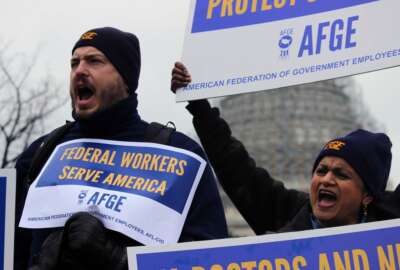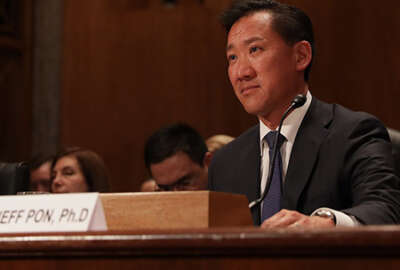
Senators express ‘serious concerns’ over agency compliance with EO court order
A group of senators want more answers from the Office of Personnel Management about how agencies are complying with an August court order that invalidated the...
Best listening experience is on Chrome, Firefox or Safari. Subscribe to Federal Drive’s daily audio interviews on Apple Podcasts or PodcastOne.
Agencies have been slow to comply with a recent court ruling that invalidated nine key provisions of the president’s May executive orders, a group of senators said Thursday.
Sixteen Democratic senators have written to acting Office of Personnel Management Director Margaret Weichert to express “serious concerns” about the way agencies are responding to the court order, which a federal district judge ordered back in August.
Both Virginia Sens. Tim Kaine and Mark Warner, along with Maryland Sens. Ben Cardin and Chris Van Hollen, were signatories to the Nov. 1 letter. Sens. Brian Schatz (Hawaii), Elizabeth Warren (Mass.) Patty Murray (Wash.) and Dick Durbin (Ill.) were among the others that signed on as well.
The senators also expressed dismay with OPM’s guidance, which briefly told agencies to “fully comply” with the order.
“The guidance did not address specifically what agencies should do about any illegal actions already taken to implement the invalidated sections of the EOs,” the senators wrote. “Since this time, it has become clear that agencies have failed to adhere to your office’s guidance and continued with implementation of the invalidated EOs by either resuming their previous efforts or by engaging in bad-faith negotiating tactics during collective bargaining negotiations.”
The letter cited reports from the Health and Human Services Department, which has declared an impasse with the National Treasury Employees Union after brief attempts to agree on the agency’s collective bargaining proposals, failed. HHS wants to eliminate more than 20 articles of the agency’s existing collective bargaining agreement. Eliminating previously-agreed-to articles on telework or transit subsidies, for example, would free the agency to make changes to those programs without consulting with the union.
The Social Security Administration is attempting something similar with its union, the senators noted. The Environmental Protection Agency and Veterans Affairs Department have also “engaged in tactics during collective bargaining negotiations that amount to clear examples of bad-faith bargaining,” the letter reads.
In addition, the senators want to know:
- Whether OPM will issue new, specific guidance detailing how agencies should comply with the court order;
- What actions OPM is taking to restore the “status quo ante” at agencies where invalidated provisions of the president’s EOs were implemented prior to the court order;
- What timeline of actions OPM is planning to bring agencies into compliance with the court order;
- How much oversight, if any, OPM has performed to ensure agencies comply with the Civil Service Reform Act of 1978; and
- What efforts OPM has taken to date to ensure agencies are complying with the president’s executive orders.
Responses are due to the senators by Nov. 16.
“We take our duty to conduct oversight of federal agencies very seriously,” they wrote. “In order to ensure good labor relations within the executive branch, and to avoid labor strife, it is of paramount importance that agencies engage in good-faith collective bargaining and adhere to the relevant civil service statutes.”
Some agencies may be slow to respond to the August court order, as they wait for action on the Trump administration’s recent appeal on the matter.
The case now awaits action in the U.S. Court of Appeals for the District of Columbia Circuit. That court recently denied the administration’s motion to expedite the matter. If government attorneys had won the motion to expedite, the appeals court would have been on a path to hear oral arguments soon after the new year.
AFGE battles with EEOC over disciplinary procedures
The executive orders are also prompting heated discussions between the American Federation of Government Employees and the Equal Employment Opportunity Commission, which is imposing a series of new disciplinary procedures on employees.
EEOC has told the union it plans to implement a new table of penalties — a list of specific examples of misconduct and corresponding actions of discipline and punishment — by Dec. 3, said Gabrielle Martin, president of AFGE’s national council of EEOC locals.
EEOC declined to comment about its situation with the union or its new proposed table of penalties.
EEOC’s collective bargaining agreement with AFGE doesn’t expire until next year, Martin said. The existing CBA dictates how EEOC will manage and discipline employees for misconduct or poor performance.
If the agency wants to make changes to the content that appears in that CBA, it should, in theory, discuss the matter and negotiate with the union in “good faith.”
“The executive order still says they have to go back and deal with the union and the union’s CBA,” Martin said. “We have provisions about discipline, and we have provisions that say if you’re going to make these changes and implement new things, you have to give [them to the] union and negotiate over the impact.”
Martin said EEOC first began engaging with AFGE about a new table of penalties late last year, before the president signed three executive orders designed to place new limits on official time and collective bargaining and more easily fire poor performers.
Though AFGE argues that the new table of penalties doesn’t guarantee employees have a set time to improve their performance, the issue for the union lies particularly in how EEOC is engaging with employees — and the message it sends to the rest of the federal community. EEOC investigators, attorneys and judges typically evaluate cases where an agency or employer’s treatment of their employees is at question.
“It’s a bitter pill to swallow to have someone say, ‘You have to go out and fight these fights for everyone else, but oh by the way, if we think you did something wrong, we’re just going to discipline you however we feel regardless of any other circumstances or mitigation,'” Martin said.
Copyright © 2025 Federal News Network. All rights reserved. This website is not intended for users located within the European Economic Area.
Nicole Ogrysko is a reporter for Federal News Network focusing on the federal workforce and federal pay and benefits.
Follow @nogryskoWFED





